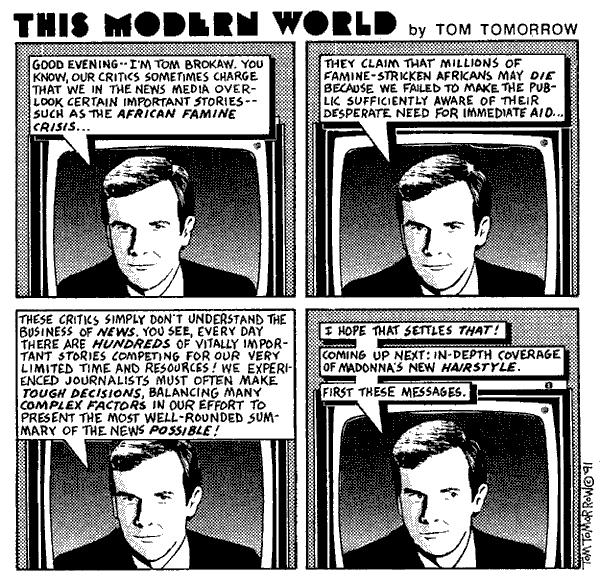Over the past decade, as oil prices have risen ever higher, oil companies have begun a massive – and massively destructive – project of tearing Canada’s boreal forest to pieces, in order to get at a layer of sand that contains 10% oil. To get the oil out, they need three barrels of natural gas for every barrel of oil produced. The process creates vast lakes of polluted water – which already cover 50 square miles – that are seeping into the groundwater and rivers, poisoning Indigenous communities; already, thousands of ducks have died after landing in these wastewater lakes. The wreckage from this horribly destructive process already covers 500 square miles – but the area earmarked for future destruction is the size of Florida. Protests of Indigenous peoples are being ignored. Politicians are redirecting money from clean energy projects to finance tar sands research. And all this is happening in our friendly neighbor to the north, Canada – and U.S. oil companies are raking in huge profits from tar sands oil, and are pumping the world’s dirtiest oil from Alberta straight to your gas tank.
Sounds like a pretty important news story, right?
 The Canadians obviously think so. When RAN hung a banner outside Royal Bank of Canada’s headquarters six weeks ago – only one of countless protests against the tar sands that have taken place in Canada in recent years – the protest was covered by Bloomberg, the National Post, the Toronto Sun, the Calgary Herald, and the Vancouver Sun. Search for “oil sands” on the Toronto Globe and Mail‘s website, and you’ll find over 4,000 articles.
The Canadians obviously think so. When RAN hung a banner outside Royal Bank of Canada’s headquarters six weeks ago – only one of countless protests against the tar sands that have taken place in Canada in recent years – the protest was covered by Bloomberg, the National Post, the Toronto Sun, the Calgary Herald, and the Vancouver Sun. Search for “oil sands” on the Toronto Globe and Mail‘s website, and you’ll find over 4,000 articles.
The British also think so. In London recently, five Indigenous Canadian activists joined the UK Climate Camp, to protest British corporations’ involvement in the Alberta tar sands. The protests that these activists organized against British companies that fund the tar sands made news across the country, with reports by the Guardian, the BBC, the Daily Telegraph, and the Times. But this was by no means the first time the tar sands were reported on in the UK: the Guardian did a detailed investigative report on the tar sands over a year ago.
And even… the Norwegians think so. In Norway, the tar sands have become a prime election issue: the opposition Liberal Party is attacking the government for allowing the state-owned oil company, Statoil, to invest in Canada’s tar sands. All you Norwegian-speaking readers out there can check out an editorial by Aftenposten, Norway’s biggest newspaper, denouncing Statoil’s investments in Canadian “oljesandprosjekter” (that’s “oil sands projects”). Skandaløs!
But in the U.S. corporate media? Radio silence.
This is especially ridiculous, given that U.S. corporations are far more involved in the tar sands than their British (or Norwegian) counterparts. Chevron and ExxonMobil have invested a total of over $10 billion in Alberta tar sands projects – Chevron is the majority owner of the 85,000-acre Ells River tar sands project, while Exxon’s subsidiary, Imperial Oil, owns 465,000 acres of “quality oil sands leases.” Citigroup is the biggest tar sands investor outside Canada, with $5.9 billion invested in Canadian tar sands companies since 2007 alone. And oil companies across the U.S. are building pipelines and retooling refineries to be able to process oil from Canada’s tar sands: a new pipeline from Alberta to Wisconsin, capable of pumping 450,000 barrels per day of Canadian tar sands oil to refineries in the Midwest, was recently approved by the Obama administration. And Chevron has been fighting against community activists for years to be able to “upgrade” its refinery in Richmond, California, so that it can process tar sands oil.

The Canadian tar sands aren’t a Canadian problem. They’re a massive project in which U.S. corporations are intimately involved, and hugely implicated.
And yet – with a few notable exceptions, like a recent article in the New York Times – the U.S. news media has ignored the issue. And thus, most Americans know nothing about the fact that the world’s dirtiest oil is being put into their gas tanks.
Next week, Canadian Prime Minister Stephen Harper is visiting Washington to meet with President Obama. Harper is as conservative as they come – a lot of Canadians call him “Bush Light” – and is a strong supporter of the tar sands. One of his biggest priorities in coming to the U.S. is to ensure that new climate legislation being written in Washington doesn’t prevent the tar sands oil from continuing to flow to his southern neighbor.
And the Obama administration has signalled that it’s willing to play ball: in June, Energy Secretary Steven Chu stated at the Reuters Global Energy Summit that he believes that the “environmental issues” facing the tar sands would be overcome through technological advancements, stating that “I’m a big believer in technology.”
As Harper tries next week to sneak the world’s dirtiest oil into the U.S., will the U.S. news media report on it? Or will they look the other way, like they have until now?